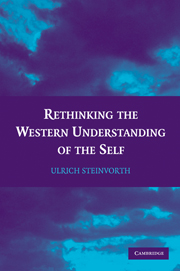Book contents
- Frontmatter
- Contents
- Preface
- Part I Introduction
- Part II Basics of Philosophical Psychology
- Chapter 2 Heideggerian and Cartesian Self
- Chapter 3 Free Will
- Chapter 4 Cartesian, Lockean, and Kantian Self
- Chapter 5 Extraordinariness and the Two Stages of Rationality
- Part III The Cartesian Self in History
- Part IV Value Spheres
- Part V A Self-Understanding Not Only for the West
- Select Bibliography
- Index
Chapter 3 - Free Will
Published online by Cambridge University Press: 05 June 2012
- Frontmatter
- Contents
- Preface
- Part I Introduction
- Part II Basics of Philosophical Psychology
- Chapter 2 Heideggerian and Cartesian Self
- Chapter 3 Free Will
- Chapter 4 Cartesian, Lockean, and Kantian Self
- Chapter 5 Extraordinariness and the Two Stages of Rationality
- Part III The Cartesian Self in History
- Part IV Value Spheres
- Part V A Self-Understanding Not Only for the West
- Select Bibliography
- Index
Summary
There is no doubt that we can act voluntarily. even animals have a power of originating actions, which enables them to act spontaneously, without a stimulus that causes them to act in the very way they act 1. Yet there is doubt as to whether we have free will, a will, that is, that makes our decisions independent of any predetermining factor and yet requires ascribing them to us as the agents responsible of them. It is important to distinguish the capability of acting voluntarily, the freedom of action, and the capability of acting by free will, the freedom of the will. Though Aristotle had already distinguished them, today quite a few theorists confound them. In particular, compatibilists, who argue that we can both accept determinism and free will, do so, relying on the trivial truth that freedom of action and determinism are compatible. Unlike Descartes and Leibniz, they neglect that the answer to the question of whether we have freedom of will or only freedom of action depends on our understanding of what happens in our deliberation of reasons before and when we judge.
Let us look at the arguments of Descartes and Leibniz. In a letter to Mesland, who had asked for clarification of contradictory assertions on free will in the 4th Meditation, Descartes argued that in deliberating reasons before passing a judgment, no reason can ever absolutely determine our judgment, however convincing or strong the reason may be.
- Type
- Chapter
- Information
- Rethinking the Western Understanding of the Self , pp. 24 - 36Publisher: Cambridge University PressPrint publication year: 2009

